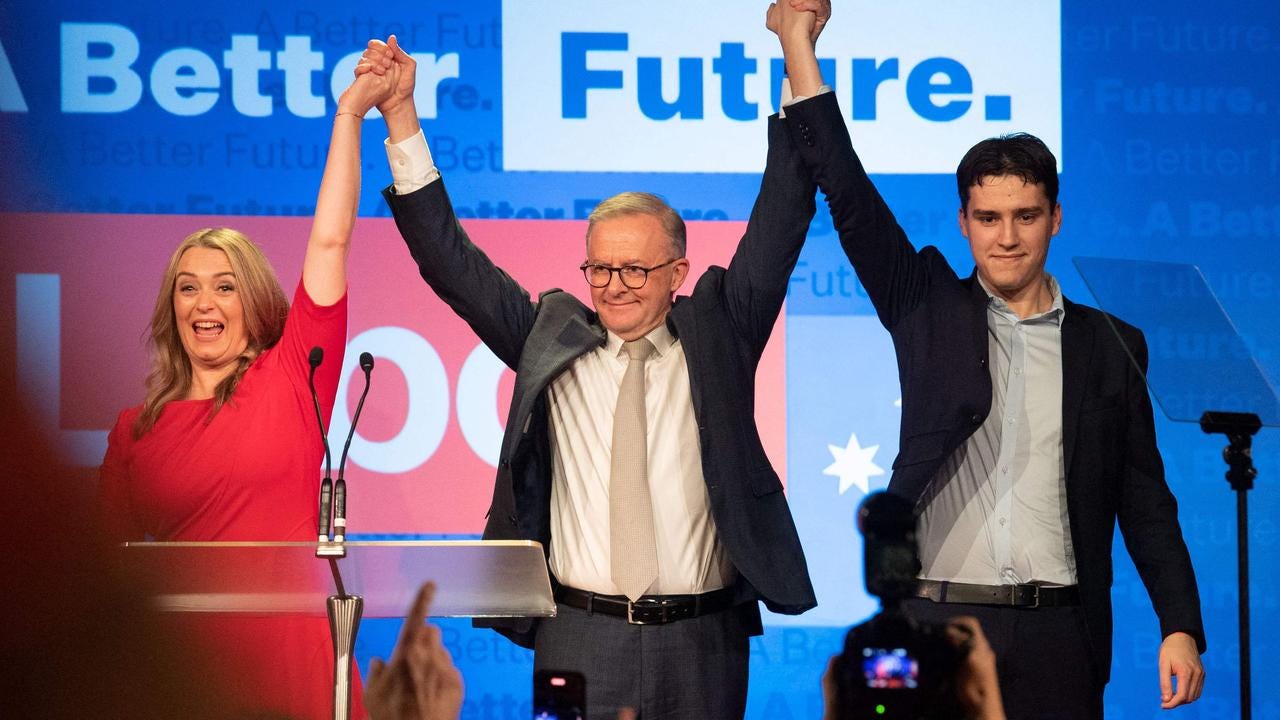My latest Blogstack It’s now just over 18 months since the 2022 election, so we are halfway through the the Albanese government’s term. At this point, it looks highly unlikely that the government will be returned with an outright majority, whenever the next election is held. So, it’s worth thinking about the government’s strategy, why it has apparently failed and whether it ever had a chance of success.Even before the 2019 election Albanese was positioning himself to challenge Shorten from the right if Labor did badly in the Longman by-election. That didn’t happen and Labor went into the election with all the opinion polls pointing to anarrow win. When the result turned out to be a narrow loss, the political class took that as an emphatic rejection of Shorten’s ambitious program
Topics:
John Quiggin considers the following as important: Uncategorized
This could be interesting, too:
tom writes The Ukraine war and Europe’s deepening march of folly
Stavros Mavroudeas writes CfP of Marxist Macroeconomic Modelling workgroup – 18th WAPE Forum, Istanbul August 6-8, 2025
Lars Pålsson Syll writes The pretence-of-knowledge syndrome
Dean Baker writes Crypto and Donald Trump’s strategic baseball card reserve
My latest Blogstack
It’s now just over 18 months since the 2022 election, so we are
halfway through the the Albanese government’s term. At this point, it
looks highly unlikely that the government will be returned with an
outright majority, whenever the next election is held. So, it’s worth
thinking about the government’s strategy, why it has apparently failed
and whether it ever had a chance of success.
Even before the 2019
election Albanese was positioning himself to challenge Shorten from the
right if Labor did badly in the Longman by-election. That didn’t happen
and Labor went into the election with all the opinion polls pointing to a
narrow win. When the result turned out to be a narrow loss, the
political class took that as an emphatic rejection of Shorten’s
ambitious program rather than the result of contingent factors
(Shorten’s lack of likeability, Bob Brown’s disastrous convoy to
Queensland, a lousy campaign etc).
Having dumped the 2019
platform, Albanese adopted a strategy based on the idea that Labor could
spend its first term demonstrating its competence in managing and
tweaking the policies inherited from the LNP, modified with a handful of
signature initiatives: the Voice, the Housing Australia Future Fund,
and a Federal ICAC (if there were any others, I’m not aware of them).
Success implementation of this strategy would, it was hoped, build
popular support for more progressive (though not radical) policies in
Labor’s second term.
The second part of this strategy has
failed comprehensively. The Voice referendum was always a long shot, but
Albanese’s mishandling of it ensured a crushing defeat. The fraudulent
nature of HAFF made it an easy target for the Greens, who forced Labor
to massively enlarged it. The issue of rental affordability now belongs
to the Greens even more than before.
Federal
ICAC has happened, but it was always going to be a damp squib. Contrary
to the hopes of some Labor supporters, we aren’t likely to see Morrison
or his ministers in ICAC’s sights, although they were discredited by
the Robodebt Royal Commission. More importantly, while avoiding (so far)
the excesses of ministers like Stuart Robert, Labor hasn’t
significantly improved on the LNP in terms of transparency or probity –
Nathan Albanese’s Chairman’s Lounge membership being a small but telling
example for the vast majority of us who fly economy and buy overpriced
airport food.
By contrast with the lack of significant new Labor
policies, we’ve seen a steady stream of reviews of LNP policy on higher
education, infrastructure, migration and the NDIS. There have been
changes to the previous government’s policies on industrial relations
and climate change, where the ferocity of opposition from the Murdoch
press and the mining sector has obscured the modesty of the actual
policies.
The government and its sympathisers in the media, notably Katharine Murphy and Michelle Grattan,
feel that they aren’t getting enough credit for this activity which
they see, in Grattan’s words as a ‘tsunami’ of policy, while the media
generally is distracted by scandals over detainees. Similarly, they
point to a bunch of small-bore measures seen as addressing the ‘cost of living’ problem, and say that doing anything more would make inflation worse.
But
this is Parliamentary Triangle bubble thinking at its worst. Reviewing
and adjusting existing policies is important and keeps ministers and
public servants busy, but it doesn’t give voters any reason to re-elect a
government, even if it has a somewhat more competent team. It’s no
surprise that the public and the media are more interested in scandals,
real or imaginary.
The framing of a decline in real wages as a
‘cost of living’ problem is inherently reactionary and has led the
government to support the explicit Reserve Bank policy of holding wages
down as a way to reduce inflation. Unsurprisingly, this hasn’t done
anything to alleviate the actual situation of wage-earners dealing with
falling real incomes.
Even worse, by maintaining the previous
government’s tax policies, Labor has chosen to deliver the regressive
components – axing the Low and Middle Income Earners tax offset and the
Stage 3 tax cuts, while Morrison retains the credit for the more
progressive Stages 1 and 2.
Coming back to the calendar, the
government will be going into election mode after the 2024-25 Budget.
That doesn’t leave much time for policy initiatives that aren’t already
well in train. The only real chance for a policy reset is a big change
to the Stage 3 tax cuts. I don’t think that will be enough to save
Labor’s majority but it would provide a basis for a genuine contest with
Dutton, which I think he would lose. Without a new tax policy, the
question isn’t whether Labor will retain a majority but whether it will
get a second term at all.

